Sarah Groff’s path to self-belief
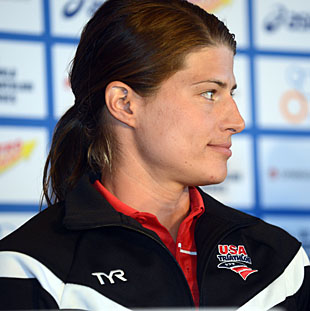
In some ways, Sarah Groff was the most impressive competitor at the 2012 London Olympic Triathlon. The top American had only scored one podium in her six year career ITU career. But as the rest of the field was left behind one by one in a big stakes version of Ten Little Indians, Sarah Groff first dropped back then miraculously found the energy to rejoin the heavy hitters Lisa Norden, Nicola Spirig and Erin Densham at the front with a kilometer to go on the run to the finish. Left behind in Groff's wake were certified stars like Andrea Hewitt, Helen Jenkins and Anne Haug.
Although she faded with 250 meters to go and finished 4th, Groff found the composure at the finish and many new admirers when she embraced her great but medal-less race. This year, she has taken a break and begun her quest for Rio in 2016 with renewed energy and greater faith in herself. One good sign was her 2nd place finish at the Escape From Alcatraz.. Today, she attacks the ITU World Triathlon Series circuit at San Diego.
Slowtwitch: Many people say it is the most painful thing to finish 4th at the Olympics. But you had a different take.
Sarah Groff: Yes. It's bittersweet to finish 4th. But I think a lot of people have really responded to the duel I was involved in. It was absolutely a fight where I was just so proud for putting myself back into the mix for the win .
ST: What was your goal going into the London Olympic race?
Sarah: My goal was to be in the mix with one kilometer to go.
ST: You didn't fall back until 250 meters to go. Had you sold yourself short?
Sarah: Yeah. But I met my expectations – and exceeded it. And exceeded other peoples' Obviously it's the Olympics. If you can have a good race there. that's the pinnacle of the sport. Obviously I would have loved to come home with a medal. but finishing 4th isn’t bad either.
ST: Can you connect that moment in 2008 at Hy-Vee where you came close but didn't make the U.S. Olympic team – and the Sarah Groff who came so close to a medal at London?
Sarah: A year out from the Trials in 2008, my goal was simply to be in position to qualify for Trials. I didn’t think I was good enough to be on the Olympic team. I walked away from that experience realizing 'I'm good enough.' It's just mentally I need to learn how to race – and to ;learn to think of myself as potentially a medalist. Potentially an Olympian. For me, the past four years have been more psychological than physiological improvement.
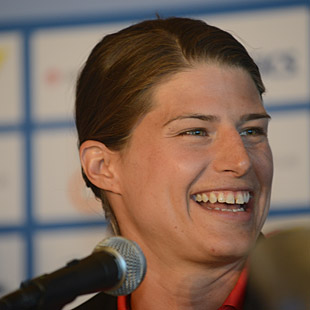
ST: It seems that Siri Lindley was the perfect coach for you in 2008 — especially at that time when you found it hard to believe in yourself?
Sarah: Siri was the first person who really believed in me.
ST: Seems she took it harder than you did?
Sarah: She took it incredibly hard. And the way she raced was she was a fighter, a warrior. She coaches with her heart. And she believed so deeply in me., it was just a matter of time before I believed in myself as much as she believed in me. It took me years but I did it. If she hadn't instilled that belief in myself, that kernel of critical self confidence? She was my first coach and she took me from being an amateur to professional to somebody who probably should have made the 2008 Olympic team. I just wasn't there yet. I've become more of the person she saw in me. One of the most meaningful messages I got after the Olympics was one from Siri. It was, basically: I'm so proud of you. I always believed in you. To read that knowing where I came from, meant the world to me.
ST: What did Siri offer you? And how did you evolve with Darren Smith?
Sarah: What I gained from Siri was that basic belief that I belonged. That I could be there some day. In the mix with the best girls.
ST: She instilled the belief that your dreams could come true?
Sarah: I didn't even have dreams. She gave me the dream. And then with Darren, he gave me the tools with which to live out my dream.
ST: Describe some of those tools.
Sarah: Darren helped give me the tools to be able to execute my race strategy. I think more than anything it is the focus on then process. under Siri I became very outcome oriented and that didn’t work for me. Where I'd get into a race situation and I wouldn’t know what to do. I would underperform when I was working with Siri. But with Darren he is very process focused. So I could become involved in the process and then the results came as a result of that.
ST: Did Darren organize workouts to strengthen you for a sprint to the finish?
Sarah: I think people get an impression Darren works his group incredibly hard. Under Siri I learned how to work hard. Under Darren I learned how to work smart. His program is definitely geared to teaching somebody how to race more intelligently and more efficiently.
ST: How can you teach somebody to pace themselves to be in a position to win – and then find more in a final sprint?
Sarah: SIGHS A lot of that comes down to race scenarios., Whether in training or in racing, that is one of the things we were not able to address prior to the Games. Somebody like Lisa Norden has had that practice in races. She was my training partner at the time. She was able to practice that throughout races. Being in the position to sprint at the end of a race. I got to the Olympics never having been in that position.
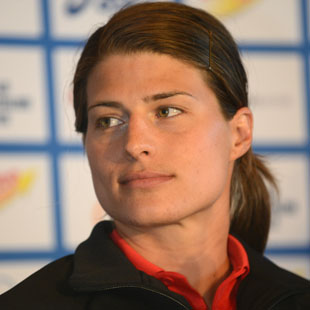
ST: Because your breakthrough podium at Kitzbuhel in 2012 didn't involve a duel to the finish?
Sarah: No. I ran most of it by myself. Ultimately you can't just show up at the Olympic Games not having trained for that scenario or done it before in a race. And expect that magically it was just going to happen. [Olympic gold medalist Nicola] Spirig and obviously [bronze medalist Erin] Densham come from running backgrounds. Lisa. All of them had been in the position where they were sprinting for a win. I was the only one in that four who had never done that before. Not even in training. So, obviously that is something I'm going to have to work on.
ST: How did it feel and what did you think when you came to the last kilometer in a sprint for an Olympic medal?
Sarah: Mentally it was 'Now what?'' That was the question I was asking myself, Because it wasn't something instinctual. It wasn't something I had ever practiced before. I had never been in that scenario. So that was the question — and that was the difference between getting a medal and getting 4th. Less physiological and more practiced mental skills. You've been in that position, you know what to do. But I had no idea. The Olympics is the last place where you want that to happen. CHUCKLES
. ST: What did you feel when you crossed the line in 4th?
Sarah: Obviously when I crossed the finish line I wanted to bawl. I wanted to curl up and just. I had to somehow realize that in the split second I had to realize what I had just done and take the positive from that. And to be able to show that to the young girls who are watching. To realize that I could have been devastated. ..But instead
ST: Were you exhilarated?
Sarah: In some ways. But like I said. It is bittersweet. Greg Bennett was one of the first people to talk to me after. He said 'Sarah' because he know better than anybody – both he and Laura got 4th at the Olympics. He said 'Sarah, I still lie in bed thinking about that race. I still lie in bed thinking about what I could have done differently.' That is always going to be with me. But I also have to think about what it took to put myself in the position to finish 4th. I think I will always be in bed thinking I should have done this and done this differently. But that doesn’t help you. That doesn’t move me forward in my career.
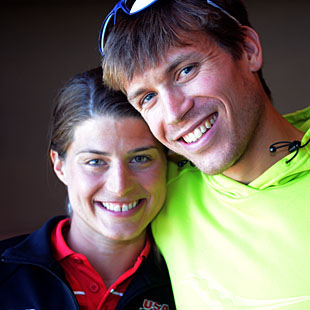
ST: What were some of the most striking positive reinforcements you got after the Olympics?
Sarah: Some people came up to me and told me they never understood why people watch football games how people get so unto it. And there were triathletes getting off their couches screaming at the computer screen at 3 AM in the morning. And finally discovered what it felt like to get so emotionally invested in somebody else's athletic performance. It is surreal that I was the cause of that. It is chilling to me. I think even more than that though. The feedback I've gotten from young girls. From age 5 to 20. Is oh! Obviously it gives me goose bumps. Girls that are racing right now. It’s just to… One of the best things I've ever heard was one of my dad's co-workers at a hospital in Cooperstown NY. I think it was like her friend's niece. She was there watching with her and she just said, 'Mom, you know it would have been great if Sarah had gotten a medal. But I just want to learn how to handle a situation like that with so much grace. '
ST: This year is the first year of the 2016 Olympic quad. What is different about your approach?
Sarah: The last 4 years was about qualifying for the Olympics. So the next couple of years are about patience. And obviously establishing a really strong foundation. for a push to Rio. And part of that foundation is making sire that my personal life us strong,. That I have something outside of sport to keep me good emotionally. Last year I hate saying it. It was all about me. And my partner was trying to qualify for his own Olympic team in the 5 and 10k. The week before Olympic Trials he got diagnosed with Lyme disease. I'm in Switzerland. I am not there for him. In some ways now I have to figure how we can move ahead in our careers. So we can make it to Rio together.
ST: What did Ben say to you after your race?
Sarah: I think he realized that I had never been in that position before and Unless you think of yourself. It was a mindset I didn’t go into the Games thinking of myself as a medalist. I thought there was a chance I could be a medalist. The difference in mindset with Lisa Norden who trains every day believing that she DESERVED a medal. I never believed I DESERVED it. I had a shot at it. But what I learned from Ben is that you have to bring that confidence with you. day in and day out. Just genuinely believe it to make it happen.
ST: It is pretty unusual to have one great athlete in a family or a couple. But you’ve got two?
Sarah: Actually Ben is in his second go around for the Olympics. The least athletic person in our house is our dog. I am the slowest runner. at any sort of distance. Ben is one of the best runners on our country. He recently came back from Poland where the US got an historic second place at the world cross country championship. He was our country's top guy in 6th place. First time in 30 years that the U.S. men got second and beat Kenya. Pretty amazing.
ST: What have you learned about sport being with Ben?
Sarah: I have learned a lot living with a runner. They don’t always understand triathlon training and think it is a bit silly.
ST: So what is the biggest change you have made this year?'
Sarah: I am no longer working with Darren Smith. Matt [Chrabot] is now working with Darren's squad an d he is doing a great job. Matt's results reflect that in the early part of the year. [3rd in Mooloolaba. Now I'm working with Joel Filliol. We were just in Florida for the winter time. It's an international group. There are few more Americans involved. I can’t work out at homer in New Hampshire on the winter. So, we will go elsewhere. But I want to strike a better balance between being home and living the year in faraway camps.


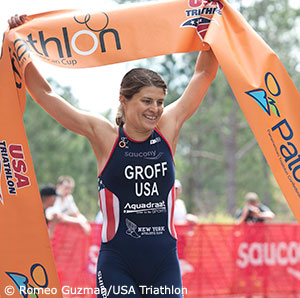
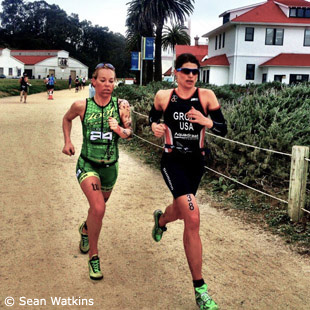
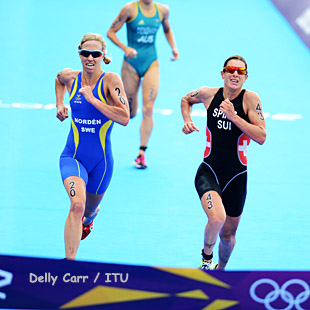
Start the discussion at slowtwitch.northend.network